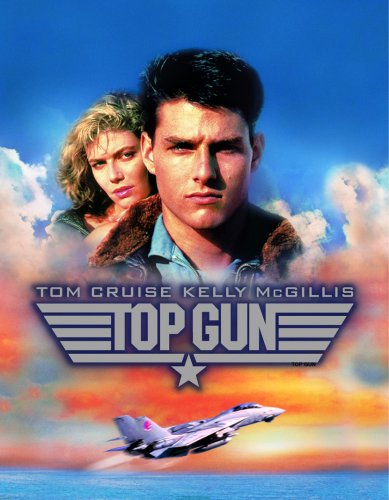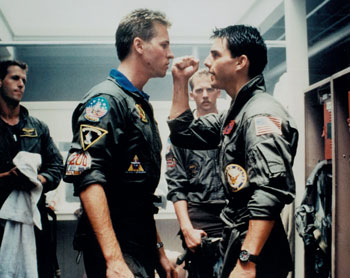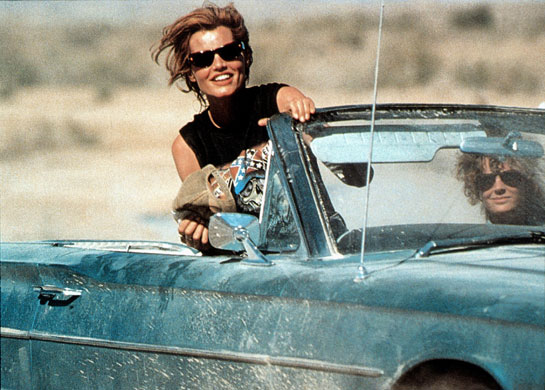

Directors: Jim Abrahams, David Zucker, Jerry Zucker , 1980.
The 70s highlighted the disaster movie genre, with Towering Inferno, Earthquake, and the Airport series. Airplane! introduced the disaster-movie spoof. And having cut their comedic teeth here, the trio of directors went on to other famous parodies, such as Naked Gun and the Scary Movie films. Though seemingly a take off on Airport, it actually rips Zero Hour. The plot is the same; so is the hero's name: Lt. Ted Striker (Robert Hays).
Striker is a WW2 fighter pilot whose war experiences left him mired in the past, fearful of flying. Since he cannot move on from these memories and the pain of those lost, he has lost his love, Elaine (Julie Hagerty in her debut role). She has chosen to move on with her life as an airline stewardess; he is stuck in a taxi-driving job. She is flying high in the sky, he is flat on the tarmac. But when he pulls up at the airport one night and enters the terminal, he is running after Elaine. Throwing caution to the winds, Ted buys a "smoking" ticket to be on the plane to talk to her.
 Ted's commitment to his relationship with Elaine and his willingness to pursue her highlights the first of two major issues raised here: running after relationships. Ted realized he wanted what he had lost. What have we lost? Perhaps our relationship with someone has stagnated and is now distant. Are we willing to drop what we are doing and chase after that relationship? It will take work. It does for Ted. But what relationship worth keeping doesn't take work? Will we sacrifice all that we have to recoup what we are missing?
Ted's commitment to his relationship with Elaine and his willingness to pursue her highlights the first of two major issues raised here: running after relationships. Ted realized he wanted what he had lost. What have we lost? Perhaps our relationship with someone has stagnated and is now distant. Are we willing to drop what we are doing and chase after that relationship? It will take work. It does for Ted. But what relationship worth keeping doesn't take work? Will we sacrifice all that we have to recoup what we are missing?Jesus told two parables about sacrificing all to gain what is worth more. Speaking of the kingdom of heaven, he spoke of a man who sold all that he had so as to buy a field where great treasure was buried (Matt. 13:44-46). Our relationship with Jesus, is like that. We must be willing to let go of everything we consider precious in this life so we might experience a true and growing relationship with Jesus. Paul said he counted it all as rubbish that he might know Jesus (Phil. 3:7-8).
Airplane! works by having some fine comic actors throwing so many one-liners that some cannot fail to arrive. Peter Graves is Captain Oveur ("Over, Oveur"), Kareem Abdul-Jabbar plays co-pilot Roger Murdock ("Roger, Roger"), although actually as himself. Funniest of all is Leslie Nielsen, who teamed up with these directors for a number of later parodies, as Dr. Rumack. His is the repeated, "Don't call me Shirley" line.
Although it parodies the older Zero Hour, it throws in spoofs of numerous films starting with an opening reminiscent of Jaws. There is a beach scene based on From Here to Eternity. and the anachronistic morphing of a WW2 Casablanca-like bar into a disco straight from
 Saturday Night Fever, complete with Travolta moves, is simply hilarious. All are played deadpan with purposefully stilted acting.
Saturday Night Fever, complete with Travolta moves, is simply hilarious. All are played deadpan with purposefully stilted acting.When most of the passengers and all the crew become ill after eating the fish, there is no one to fly the plane. Striker must choose to let the plane go down or face his fears and overcome them, even while his memories are telling him he cannot do it.
This is the second of the theme-related issues: facing our fears. Like Ted, we all have fears. Some are debilitating, leaving us unwilling to return. Others can be overcome easily. Worst fears tend to linger on. But there almost always comes a time when we must return to these fears and make a choice. When the future of others, even the lives of others, hangs in the balance, we must look our fears in the eyes and stare them down. Only by facing up to them can we overcome and emerge victorious.
The apostle John said perfect love drives out fear (1 Jn. 4:18). God knows our hearts and our minds. He knows what we are afraid of. And he will be there with us. In the most-beloved psalm, the psalmist wrote, "Even though I walk through the valley of the shadow of death, I will fear no evil for you are with me, your rod and staff, they comfort me" (Psa 23:4-5). In life, we face the choice to let fear overcome us or to engage it as Ted engaged the controls. Let's put cowardice aside, and be courageous. Jesus is beside us, with us. He will not let us down.
Copyright ©2009, Martin Baggs



 Only the best of the best, the top 1%, get to Top Gun. And the very best gets his name on the trophy. When Viper (Tom Skerritt), the commanding officer, asks him, "Do you think your name will be on that plaque?" Maverick replies, "Yes, sir." Viper puts his finger on one aspect of Maverick's attitude, "That's pretty arrogant, considering the company you're in."
Only the best of the best, the top 1%, get to Top Gun. And the very best gets his name on the trophy. When Viper (Tom Skerritt), the commanding officer, asks him, "Do you think your name will be on that plaque?" Maverick replies, "Yes, sir." Viper puts his finger on one aspect of Maverick's attitude, "That's pretty arrogant, considering the company you're in." Maverick's chief opponent is Iceman (Val Kilmer), a cool-as-a-cucumber flyer who makes no mistakes. Their mutual dislike is apparent to all. Iceman sees Maverick as a cowboy: "You're everyone's problem. That's because every time you go up in the air, you're unsafe. I don't like you because you're dangerous." This is so true. Maverick is reckless, with a disregard for safety. He is not a team player. He is a maverick who feels "the need for speed."
Maverick's chief opponent is Iceman (Val Kilmer), a cool-as-a-cucumber flyer who makes no mistakes. Their mutual dislike is apparent to all. Iceman sees Maverick as a cowboy: "You're everyone's problem. That's because every time you go up in the air, you're unsafe. I don't like you because you're dangerous." This is so true. Maverick is reckless, with a disregard for safety. He is not a team player. He is a maverick who feels "the need for speed." Maverick is almost a poster child for how a follower of Jesus should not live. We may take risks with our own lives but we need to have a compassionate care and concern for those on our team and around us. And we need to be respectful of those in authority over us, as Paul told the Roman church (Rom. 13:1). There might be times when we must bend the rules and seek forgiveness instead of permission, but deliberately disregarding denied permission, as Maverick does so often, is anathema to gospel-centered living.
Maverick is almost a poster child for how a follower of Jesus should not live. We may take risks with our own lives but we need to have a compassionate care and concern for those on our team and around us. And we need to be respectful of those in authority over us, as Paul told the Roman church (Rom. 13:1). There might be times when we must bend the rules and seek forgiveness instead of permission, but deliberately disregarding denied permission, as Maverick does so often, is anathema to gospel-centered living.
 Reality, though, hits Earle smack in the face when he gets to the sierras and meets the two punks who form his team. There is more: "Of all the 14 karat saps, starting out on a caper with a woman and a dog." The woman is Marie (Ida Lupino), a conniving former dance-hall girl, and the dog is Pod, a mutt needing a friend (Bogart's real-life dog). These two are essential to the story, and will prove to be Earle's downfall.
Reality, though, hits Earle smack in the face when he gets to the sierras and meets the two punks who form his team. There is more: "Of all the 14 karat saps, starting out on a caper with a woman and a dog." The woman is Marie (Ida Lupino), a conniving former dance-hall girl, and the dog is Pod, a mutt needing a friend (Bogart's real-life dog). These two are essential to the story, and will prove to be Earle's downfall. How often do we live in a fantasy world of our own imagination? Like Earle, we can create a world of deception, thinking differently, making more of who we are than reality reflects. Madison Avenue bombards us with all kinds of fantasies, telling us we are more than we are, we deserve better than we have. This is dangerous. As dangerous as Earle was in his real persona, believing the concoctions of our own making leads us into a quicksand that will swallow us alive. The solution is to look to the truth. Jesus offers such truth; he is the truth (Jn. 14:6). Friends can keep us safe and free with a dose of honest reality (Prov. 27:6). That is the value of community. Velma wanted to offer this to Earle, but he was not prepared to accept it from her. She was competing for his love. She had an agenda; true friends don't.
How often do we live in a fantasy world of our own imagination? Like Earle, we can create a world of deception, thinking differently, making more of who we are than reality reflects. Madison Avenue bombards us with all kinds of fantasies, telling us we are more than we are, we deserve better than we have. This is dangerous. As dangerous as Earle was in his real persona, believing the concoctions of our own making leads us into a quicksand that will swallow us alive. The solution is to look to the truth. Jesus offers such truth; he is the truth (Jn. 14:6). Friends can keep us safe and free with a dose of honest reality (Prov. 27:6). That is the value of community. Velma wanted to offer this to Earle, but he was not prepared to accept it from her. She was competing for his love. She had an agenda; true friends don't.

 Driving through Arkansas to Oklahoma and beyond, the two heroines come into contact with four men who symbolize the spectrum of males in this world. At one end of the spectrum is the obnoxious truck driver who simply wants another sexual conquest. He wants to take advantage of the women for their sexuality alone. He cares nothing for them as people. At the other end of the spectrum is Hal (Harvey Keitel), the determined but sympathetic detective hunting them down believing them to be victims of their circumstance. He is on their side, seeking to be their protector. Toward the middle is J.D. (Brad Pitt, destined for stardom after this role), a charming rogue who lies and lays but helps to bring life out of captivity for Thelma. Yet, for all his charm, he is a thief and a cheat. And there is Jimmy, who wants to do the right thing for Louise but is filled with anger at her independence. He wants control.
Driving through Arkansas to Oklahoma and beyond, the two heroines come into contact with four men who symbolize the spectrum of males in this world. At one end of the spectrum is the obnoxious truck driver who simply wants another sexual conquest. He wants to take advantage of the women for their sexuality alone. He cares nothing for them as people. At the other end of the spectrum is Hal (Harvey Keitel), the determined but sympathetic detective hunting them down believing them to be victims of their circumstance. He is on their side, seeking to be their protector. Toward the middle is J.D. (Brad Pitt, destined for stardom after this role), a charming rogue who lies and lays but helps to bring life out of captivity for Thelma. Yet, for all his charm, he is a thief and a cheat. And there is Jimmy, who wants to do the right thing for Louise but is filled with anger at her independence. He wants control. The Bible has much to say about this though it is interpreted differently. Some see it as emphasizing egalitarianism, where there is true equality between the sexes. Others see it underscoring a complementarian approach where distinctions remain. A middle ground seems more appropriate, where gender roles and distinctions remain yet essential equality is affirmed. Men and women are both made in the image of God (Gen. 1:26). Yet, there are roles carved out for them, that are not simply culturally mandated. Paul's distinctives on the qualifications of elders seem to suggest that these should be men (1 Tim. 3:2-4). Men are placed in headship over their wives and families (Eph. 5:23). This is symbolic of the relationship between Jesus and his bride, the church (Eph. 5:24-33).
The Bible has much to say about this though it is interpreted differently. Some see it as emphasizing egalitarianism, where there is true equality between the sexes. Others see it underscoring a complementarian approach where distinctions remain. A middle ground seems more appropriate, where gender roles and distinctions remain yet essential equality is affirmed. Men and women are both made in the image of God (Gen. 1:26). Yet, there are roles carved out for them, that are not simply culturally mandated. Paul's distinctives on the qualifications of elders seem to suggest that these should be men (1 Tim. 3:2-4). Men are placed in headship over their wives and families (Eph. 5:23). This is symbolic of the relationship between Jesus and his bride, the church (Eph. 5:24-33). Of course, a road-trip movie and the personal growth that goes with it is to a large degree founded on the friendship of the heroes. This is true here. Thelma says, "Louise, no matter what happens, I'm glad I came with you." Both changed through interactions with one another. Both changed through their interaction with the other characters, especially J.D.
Of course, a road-trip movie and the personal growth that goes with it is to a large degree founded on the friendship of the heroes. This is true here. Thelma says, "Louise, no matter what happens, I'm glad I came with you." Both changed through interactions with one another. Both changed through their interaction with the other characters, especially J.D.